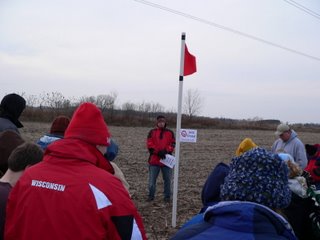
A few weeks ago, Justin Taylor sent forth the call for bloggers to review a couple of books for him, one of which was
Suffering and the Sovereignty of God. I had previously done this for
Sex and the Supremacy of Christ, and was excited for another opportunity to read such good material.
First, I should preface this by stating that prior to reviewing the book I had purchased and viewed (some) the DVD's of the conference from which these books came from. I had also listened to the MP3's of the conference as well, so getting a chance to brush back up on it and see some nuances would be a good thing for me. I love watching and listening to things, but often I find that with deep or challenging subjects I need print in front of me. That is the way I learn best in most cases.
This book was a hard read for me. Hard on many levels. First, because I have been so blessed to have lived this long with such a small amount of pain and suffering in my life. I am clothed, well fed (too well fed!) and relatively healthy by most of the world's standards. I read things like this, and am pained by other people's suffering. The joy though is that this pain is shown to be endured with God's glory in the mind of the authors, in ways that I frankly cannot fathom at this stage of my life. I appreciate the first hand telling of suffering, but it makes it hard to read because it is painful to read of these sorts of suffering. I also love the credibility that inherent with first hand accounts of suffering. I think this method is especially powerful to a post-modern cultural context as a means of great connecting points. I suspect this was at best a secondary thought or concern on the part of any of the authors, but it nonetheless is another tool that might serve useful in this context.
The first portion of the book is subtitled: The Sovereignty of God in Suffering.
In light of Pastor John Piper's recent go around with prostate cancer, his words seem laden with experience and meaning, and through it all he points to God. My only possible critique would be that the early part of the book seems somewhat dominated by the thoughts and theology of Dr. Piper. I say that not as a criticism in that it is bad, but in that having some additional voices added into the text might have been helpful, especially on subjects that were less about the experiential aspects of suffering. Dr. Piper is always clear and concise throughout his writing, but it still nice to hear other voices. That is probably why I am not payed to be the editor :-)
I appreciated the clarity of Mark Talbot in his addressing suffering in relation to the issue of Open Theism. I have long known that the root of Open Theism is the desire to "solve" the problem of pain and suffering in the context of the Christian faith. Having been on the outside edge of this controversy as it raged through the Baptist General Conference a few years ago, I was pleased to see Mark Talbot stick to a clear presentation of his beliefs in a positive way.
The second part of the book is subtitled: The Purposes of God in Suffering.
Perhaps my favorite line from the whole book came from this section. It comes from Stephen Saint, and he says:
But what I do advocate is that suffering is an important prerequisite to ministering to hurting people.
These words seem to ring true down to the depths of my toes in the context of my reading this book. It is something I have to consider, in that I hope to shortly be in full time ministry and will undoubtedly be dealing with people who are hurting in ways I have yet to imagine or experience. It scares me that I might need to suffer some before I am fully equipped to be a good shepherd of a church or part of a church. I have over the past year had the painful opportunity to see from a distance a pastor friend learn this very hard lesson as his family coped with a young daughter suffering from (and hopefully recovering from!!!) Leukemia. There is no way he would ever choose that, but I have no doubt he will have learned many deep things that I have not yet had the painful opportunity to come to terms with.
The third segment of the book is subtitled: The Grace of God in Suffering.
These final three chapters are a powerful testament of God's Grace in our lives as we suffer. I must confess that in watching the DVD's, I found Joni Eareckson Tada's segment the least appealing to me. In reading her chapter, it seemed far more interesting and relevant to my understanding of both God's Grace as well as what suffering is. I have heard her speak on a number of occasions but this is the first time reading anything of hers. The passion she has flows from the pages into the person reading the book. I really think that ending the book on her thoughts and ideas on hope springing forth from suffering was the perfect conclusion. It is a tough read emotionally, and to have it end on a high note like that seems to tie it all together very nicely.
One of the appendices contain Dr. Piper's sermon/writing of "Don't waste your cancer". This is a great addition, and something that seems perfectly suited as an appendix for a book on this subject. It seems to be far too good to leave out, but fitting it in elsewhere might have taken away from some of the other thoughts that were being developed.
The book is not a quick read (especially not Dr. Piper!) because it is a heavy subject, and it is heavily scriptural. This is not a gloss over on the subject, nor is is flim-flam presentation of "God wants you to be happy, healthy and wealthy" that is so present on things like TBN.
I would highly recommend this book with a single caveat - read this book with someone else. I read this book solo, and really felt the need to decompress with someone after some of the deeper and heavier parts. I think that reading this with another person would open an enormous amount of conversation, as well as helping each person to fully deal with their thoughts on the subject. It is far too easy to skip through some of the uncomfortable parts, but with someone else holding you accountable you will likely see far greater effects in your life from this book.
Related Tags:
Justin Taylor,
Between Two Worlds,
Suffering and the Sovereignty of God,
Suffering,
Sovereignty,
God,
Jesus,
Christ,
John Piper,
Sex and the Supremacy of Christ,
Desiring God,
Desiring God Conference,
Desiring God Ministries,
Bethlehem Baptist Church,
Baptist,
Mark Talbot,
Baptist General Conference,
Open Theism,
Problem of Evil,
Problem of Suffering,
Problem of Pain,
Evil,
Pain,
Stephen Saint,
Leukemia,
Grace,
Joni Eareckson Tada,
TBN
 (From FotF's "Pastor's Weekly Briefing")
(From FotF's "Pastor's Weekly Briefing")










